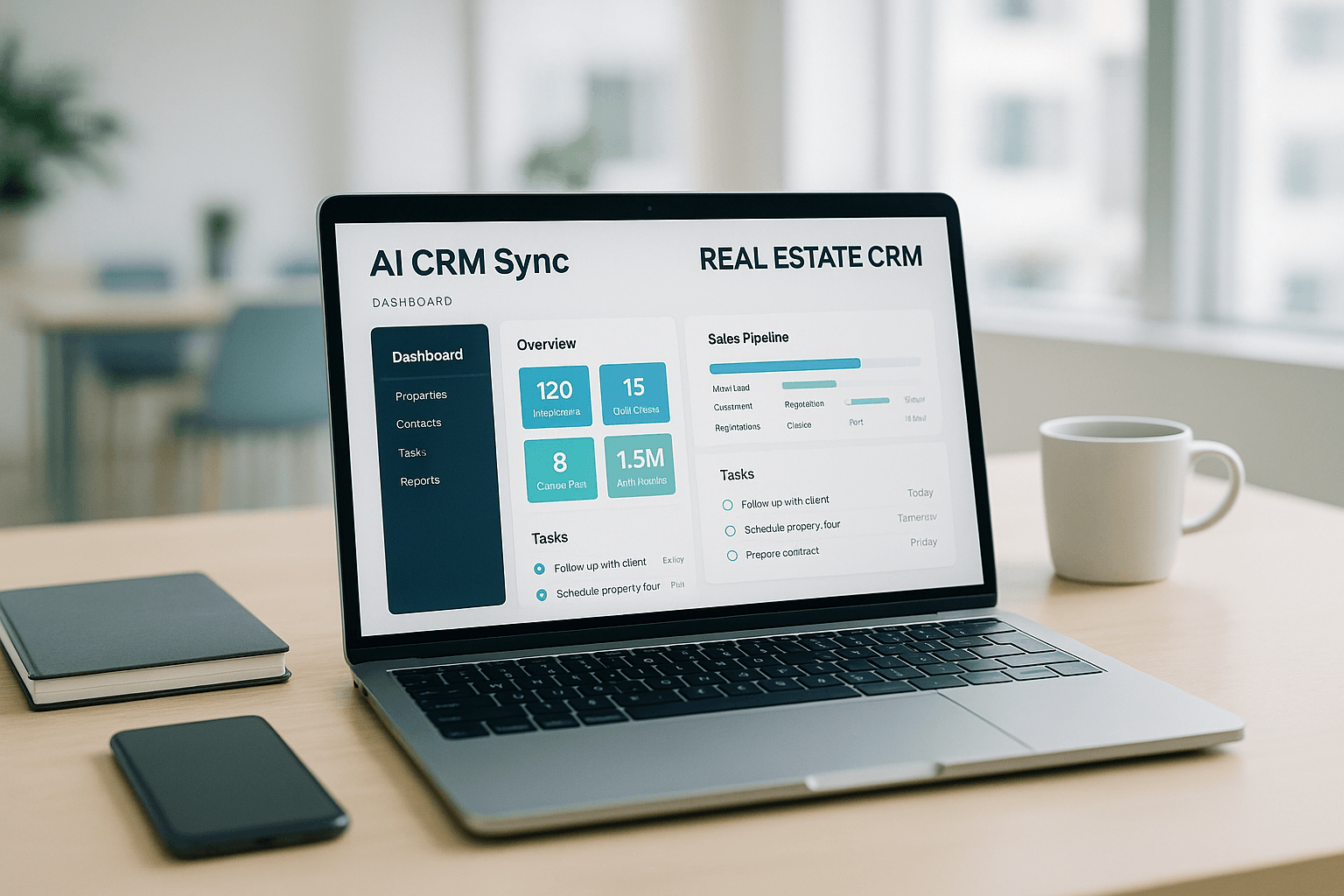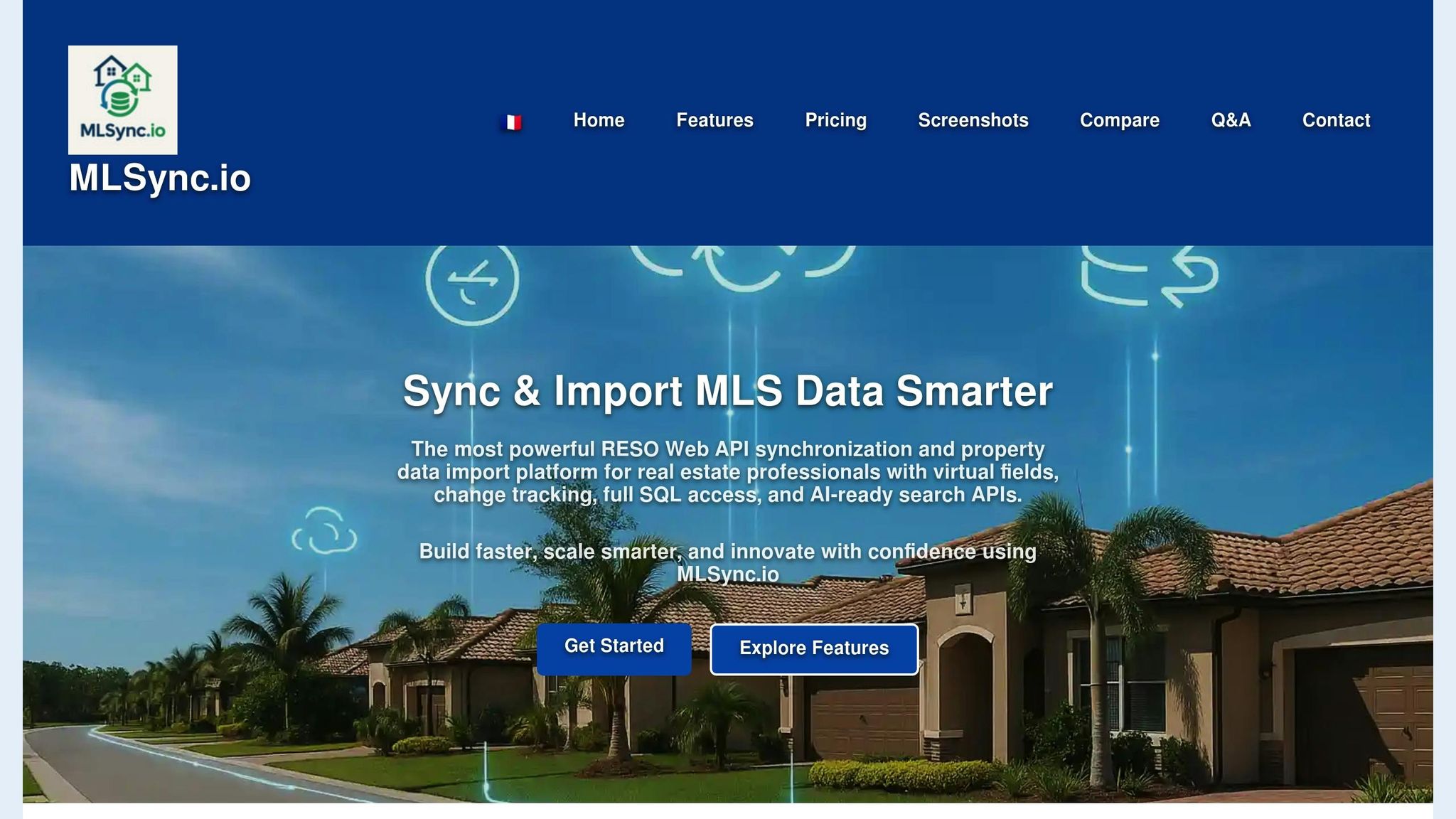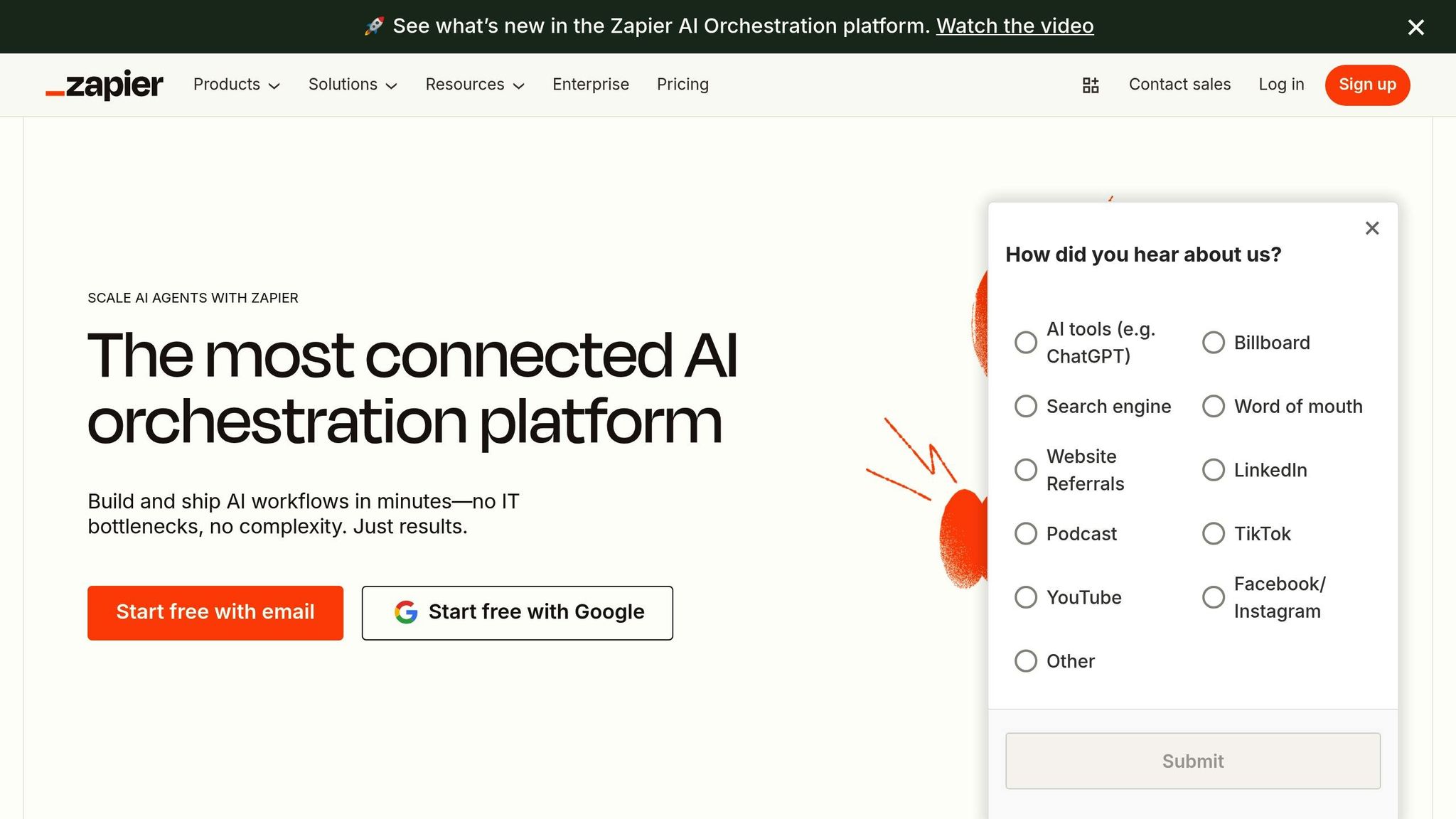
AI CRM Sync for Real Estate: Benefits and Tools
Cut manual data entry by 80% and boost lead conversion rates by 21x with AI-powered CRM tools that work around the clock.

Written by
Adam Stewart
Key Points
- Contact leads within 5 minutes to boost conversion rates by 21x
- Cut document processing from 10 minutes to seconds with AI extraction
- Reduce operational costs by 15% while increasing productivity by 25%
- Maintain compliance automatically across multiple jurisdictions
AI-powered CRM tools are transforming real estate by automating repetitive tasks like data entry, lead management, and follow-ups. They save time, reduce errors, and help agents focus on building client relationships and closing deals. Here’s what you need to know:
Key Benefits:
- Faster Lead Management: AI ranks leads by conversion potential, automates follow-ups, and ensures no lead is missed.
- Fewer Data Errors: Automation cuts manual data entry by up to 80%, saving hours each week.
- Improved Compliance: AI ensures accurate record-keeping and helps meet regulatory standards.
Top Tools:
- Dialzara: AI call handling with CRM integration for 24/7 lead response.
- MLSync.io: Syncs MLS property data with CRMs for real-time updates.
- Zapier: Automates workflows across platforms to keep processes smooth.
Emerging Trends:
- Predictive Analytics: AI forecasts client behavior and market trends.
- Voice-to-CRM: Manage records and follow-ups with voice commands.
- Blockchain: Adds security to transactions and simplifies ownership tracking.
AI CRM tools can boost productivity by up to 25% and reduce operational costs by 15%. Start small with lead management or property updates and expand as you see results.
Key Benefits of AI CRM Sync for Real Estate
AI-powered CRM synchronization is changing the game for real estate professionals by improving how they manage leads, enhance data accuracy, and stay on top of compliance requirements.
Better Lead Management
Managing leads manually often means delayed responses, missed opportunities, and inconsistent communication. AI CRM sync tackles this by automating much of the lead lifecycle, ensuring agents can respond faster and more effectively.
"AI for real estate solves challenges like the follow-up problem." - Flo Crivello, CEO
AI tools can score and rank leads using data such as price preferences, property searches, and communication patterns. This helps agents prioritize prospects with the highest potential. These systems can also handle initial outreach by sending personalized messages, making calls, and even scheduling property showings. By analyzing online behavior and social media activity, AI can identify potential leads before competitors do.
For example, Newzip, a U.S.-based proptech company, saw a 60% engagement boost and a 10% increase in conversions after implementing AI-driven personalization on their platform. Their proof of concept took just eight weeks to deliver results. AI also ensures consistent follow-ups across multiple channels - email, text, phone, and social media - eliminating gaps in communication.
On top of that, automating lead management reduces the chance of manual errors, saving time and effort.
Fewer Data Entry Errors
In real estate, manual data entry is a common source of costly mistakes. With complex property details and transactions to manage, even small errors can lead to significant financial consequences.
AI CRM sync minimizes issues like typos, duplicate entries, and missing information. For instance, automated data extraction has been shown to reduce document processing times from 10 minutes to just seconds - a 90% time savings. One mid-sized real estate firm reported cutting manual input by 80% and saving over 15 hours per week after adopting automation tools . In another case, error rates dropped by 50%, and employees were able to reallocate 75% of their time toward more valuable tasks.
By ensuring data accuracy, AI tools also help businesses maintain compliance with industry standards.
Better Compliance with Real Estate Regulations
Real estate operates under strict regulations that vary by state and locality. Manual processes can make it tough to maintain the detailed audit trails and data protection measures required for compliance. AI CRM systems streamline compliance by automating record-keeping and legal documentation, helping agents navigate complex requirements seamlessly.
This automation not only reduces risks but also strengthens client trust. As Saraswati Pundir, Senior Content Writer, explains:
"By adhering to regulatory guidelines, agents mitigate risks, build credibility with clients, and uphold ethical standards in their business practices."
Additionally, CRM systems have been linked to a 26.4% increase in sales team productivity. AI-powered CRMs standardize how data is collected, stored, and shared, minimizing compliance risks - especially for larger brokerages operating across multiple regions. These systems ensure that businesses remain aligned with regulations while maintaining a professional and ethical reputation.
Top AI Tools for Real Estate CRM Sync
When it comes to simplifying real estate operations, these AI tools stand out for their ability to streamline workflows, improve lead management, and minimize manual errors. They’re designed to handle repetitive tasks, ensuring real estate professionals can focus on what they do best - building relationships and closing deals.
Dialzara: AI-Powered Call Handling with CRM Integration

Dialzara is an AI-driven virtual phone answering service tailored for small and medium-sized businesses, including real estate agencies. It offers 24/7 call answering and integrates seamlessly with over 5,000 business applications.
Setting up Dialzara is straightforward. Create an account, answer a few business-related questions, select a voice and phone number, and activate call forwarding. The platform’s AI is trained to understand industry-specific terminology and mimics your customer engagement style, making it feel like a natural part of your team. Not only does it save up to 90% of the cost compared to hiring additional staff, but its round-the-clock availability ensures quick lead response - crucial, as leads contacted within five minutes are 21 times more likely to convert.
MLSync.io: Seamless MLS Data Integration

MLSync.io is a specialized tool that connects Multiple Listing Service (MLS) databases with CRM systems, automating the synchronization of property data. By eliminating the need for manual data entry, it ensures agents always have the most up-to-date property information.
This platform provides real-time updates on listings, price changes, and status modifications. It also automates time-consuming tasks like data entry, email follow-ups, and appointment scheduling, saving real estate agents an average of 20 hours per week. MLSync.io handles complex property details, ensuring consistency in photos, descriptions, and other listing information between MLS platforms and your CRM.
Zapier Automations: Connecting Workflows Across Platforms

Zapier simplifies real estate workflows by connecting CRMs with thousands of applications. It automates tasks across platforms, ensuring data stays synchronized and processes run smoothly. For example, when a new lead is added to your CRM, Zapier can automatically send a welcome email, create a follow-up task, and add the contact to your marketing campaigns.
This flexibility allows agents to automate processes like managing leads, scheduling showings, and sending reminders. By integrating CRMs with tools like email marketing platforms, calendars, and communication apps, Zapier ensures no lead is overlooked and workflows remain efficient.
To make the most of these tools, real estate professionals should focus on identifying repetitive tasks they can automate - like lead management or contract processing - and regularly evaluate their workflows for potential improvements. These tools are designed to free up time, allowing agents to dedicate more energy to client interactions and closing deals.
Best Practices for Implementing AI CRM Sync
Once you've selected the right AI CRM tools, it's time to put them to work effectively. Following best practices for integration, conflict resolution, and compliance can help you get the most out of your system while maintaining data accuracy and meeting regulatory standards.
Field Mapping for Smooth Integration
Field mapping is the key to ensuring data flows seamlessly between your CRM and AI tools. It connects data fields from different systems, minimizing errors and preventing mismatches.
Start by clarifying your integration goals, such as reducing lead response time or improving service quality. Check for system compatibility and clean up your existing data - this means removing duplicates and standardizing formats to avoid complications later.
The mapping process itself involves creating rules that guide how data moves between systems. For example, if your CRM uses "Client Name" and your AI tool expects "Customer Name", set up a rule to automatically translate this field during synchronization. Testing is critical here - run through different scenarios to catch any issues before going live. This way, you can make adjustments without affecting your active customer database.
Take Demandbase as an example. Their platform allows users to sync CRM fields through a web interface. Users can map Demandbase fields to their CRM's Account, Contact, and Lead objects, ensuring data flows correctly. This kind of precise mapping not only reduces errors but also boosts overall efficiency.
Managing Data Conflicts
Data conflicts can arise when information doesn't match between systems, leading to duplicate records, inconsistencies, and unreliable data. These issues can disrupt operations and erode trust in your CRM.
To tackle this, establish clear validation rules for critical fields like phone numbers and addresses. Automating these checks ensures data meets your standards before entering the system. Regular audits and cross-source verification also help maintain consistency across different data sources.
Data profiling is another useful tool. It helps you identify recurring problems, such as duplicate entries or incomplete information, that might not be obvious during daily operations. AI tools can assist here by flagging inconsistencies, suggesting corrections, or even filling in missing details. For instance, AI scoring can evaluate the quality of property listings, pointing out areas that need improvement.
Keep an eye on data quality metrics like duplicate rates and validation failures. Monitoring these indicators gives you valuable insights into the effectiveness of your data management efforts and helps guide improvements.
Automated Audit Trails for Compliance
Audit trails are essential for ensuring accountability, transparency, and security within your CRM system. For industries like real estate, maintaining detailed records is crucial for meeting regulatory requirements and protecting sensitive customer information.
To secure your audit system, use techniques like log sequencing with cryptographic chaining. This adds an extra layer of integrity, making records tamper-evident. Limit access to audit logs to authorized personnel only, and ensure data immutability - once a record is created, it should remain unaltered.
Take inspiration from Mayo Clinic, which implemented a centralized audit system that reportedly cut compliance reporting time by 67%. Their approach highlights the efficiency gains of well-organized audit processes.
Capture detailed contextual information for every action - what happened, why, where, when, how, and who was involved. Use a tiered logging approach, focusing more on high-risk activities like financial transactions or contract modifications. A data dictionary can help standardize the information captured, making retrieval easier for compliance or investigations.
Effective monitoring and alerting systems are another must. Use rules-based engines and statistical analysis to detect anomalies or potential security incidents in real-time. Start small with high-priority alerts and expand as your system matures. For example, Goldman Sachs processes over 20 billion daily events with a false positive rate of just 0.001%, demonstrating how precision in monitoring can reduce noise while enhancing security.
Retention policies are also critical. Develop a retention matrix that aligns data types with regulatory requirements, ensuring records are kept for the appropriate timeframes. Automate these policies and establish clear procedures for legal holds and exceptions. Pfizer's global classification system, which reduced storage costs by 28% while improving compliance, shows how targeted retention strategies can benefit both cost management and privacy.
Finally, regularly test and validate your audit trail system. Schedule both planned and surprise assessments, and use realistic scenarios to ensure the system can handle operational challenges. Document everything - tests, results, and remediation steps - to demonstrate diligence to regulators. A robust audit trail system not only enhances compliance but also strengthens your organization's overall data security.
sbb-itb-ef0082b
New Trends in AI CRM for Real Estate
The latest advancements in AI-powered CRM systems are reshaping real estate operations, offering tools that boost efficiency and improve client service. Let’s explore some of the most impactful developments.
Predictive Analytics for Client Insights
Predictive analytics leverages historical data, market patterns, and machine learning to forecast outcomes and prioritize leads. This allows agents to shift from intuition-based decisions to precise, data-backed strategies for engaging with clients.
This technology analyzes massive datasets that would be overwhelming for manual processes. For instance, the National Association of Realtors reports that 97% of home buyers use the internet during their search, generating a wealth of behavioral data. AI can sift through this information to uncover patterns that might go unnoticed, helping agents predict client preferences and market trends with greater accuracy.
Research backs up the power of predictive analytics. A study by the Massachusetts Institute of Technology found that properties flagged as "high potential" by predictive algorithms delivered an average of 25% higher returns compared to traditional methods. Similarly, Harvard Business Review revealed that investors using predictive timing models outperformed the market by 15% over five years.
Real-world examples highlight the benefits. In 2022, REX Real Estate introduced an AI-driven platform to match buyers with properties. This approach cut marketing expenses by 35% while boosting conversion rates by 2.3 times. Advanced models, such as those using gradient boosting or neural networks, have achieved prediction accuracy within 5–10% of actual sale prices. Zillow’s Zestimate is a prime example, with its median error rate improving from over 14% in 2006 to around 3.6% for on-market homes.
To get the most from predictive analytics, real estate professionals should define clear goals and integrate diverse data sources, such as social media trends and demographic shifts, alongside traditional property data. Combining these insights with voice technology can further streamline workflows, simplifying data entry and response times.
Voice-to-CRM Integration
Voice-to-CRM technology enables agents to manage records and follow-ups through voice commands, significantly improving productivity. Speaking is up to three times faster than typing, making this tool a game-changer for time-strapped professionals.
Real estate companies have already seen impressive results. In April 2025, SumUp integrated Leadbeam's voice-to-CRM feature into its sales operations, leading to a sixfold increase in data accuracy and saving reps over five hours per week on manual tasks. Regional Homes Realty used AI voice qualification to cut lead response times from 3.7 hours to under two minutes, resulting in a 47% increase in qualified appointments. Metro City Realtors implemented an AI-powered voice follow-up system, closing 23 deals from previously inactive leads in just one quarter, generating $7.4 million in transaction volume.
Dialzara’s AI phone service is another example, offering voice-to-CRM capabilities that ensure no leads are missed, even after hours. This system handles calls, transfers, messages, and bookings with lifelike AI technology.
Voice-enabled CRM systems also provide remote access to data. AI voice assistants can analyze past interactions, prioritize leads, and offer real-time suggestions during calls.
"The AI voice system has completely transformed our operation. We're capturing opportunities we previously missed, our agents are spending time on dollar-productive activities instead of administrative tasks, and our clients are impressed with our responsiveness. It's been our most valuable technology investment in a decade."
– Jennifer Chambers, Managing Broker, Coastal Properties Group
To maximize the benefits, start with focused applications like lead qualification or automating property information. Gradually expand to more complex tasks, ensuring a natural and effective conversational flow.
Blockchain for Secure Transactions
Blockchain technology is revolutionizing the way real estate transactions are conducted by creating secure, tamper-proof digital records. This innovation not only provides verifiable proof of ownership but also reduces costs and streamlines processes.
Fraud prevention is a major advantage. The FBI reported over 11,500 victims of real estate internet fraud in the U.S. in 2021. Blockchain’s decentralized structure eliminates vulnerabilities associated with traditional systems, offering a higher level of security and trust. Smart contracts further simplify transactions, cutting out intermediaries and reducing costs.
Several successful implementations highlight blockchain’s potential. In the Republic of Georgia, a blockchain-based land registry has drastically reduced fraud, such as double selling. Sweden’s Land Registry completed a blockchain-only property transaction in a pilot project, and Vermont has legally recognized blockchain-based property transactions since 2018.
Tokenization is another exciting development. It allows physical assets to be divided into digital tokens, making properties easier to buy, sell, and trade. A University of Oxford study found that tokenized real estate investments could outperform traditional methods by up to 30%.
For CRM systems, blockchain ensures an immutable audit trail, simplifying compliance and reporting. It also streamlines title management by creating a permanent digital record of ownership, eliminating many of the time-intensive verification steps currently required.
Beyond transactions, blockchain is being used in property management for tenant contracts, rent collection, and maintenance requests. Crowdfunding real estate projects through blockchain is also gaining traction, with emerging technologies like AI and IoT enhancing these applications.
Conclusion: Improving Efficiency with AI CRM Sync
Integrating AI with CRM systems is reshaping the real estate industry by streamlining operations, improving client relationships, and driving profits. Real estate agents using CRM tools report up to 25% higher productivity, while teams leveraging CRM analytics have seen annual transaction volumes rise by as much as 30%.
Companies adopting AI-powered CRM solutions often experience operational savings of up to 15%, with nearly half of real estate agents noticing measurable cost reductions. Moreover, organizations using generative AI report profit increases exceeding 10%, thanks to enhanced operations, better tenant retention, and smarter investment decisions.
AI tools are also making specific tasks far more efficient. For instance, AI pricing agents cut pricing-related work time by up to 80%, and AI-driven systems now manage 80% of lead generation interactions, allowing agents to focus on closing deals.
Automated and personalized communication significantly boosts client satisfaction, with a 65% increase attributed to timely follow-ups and insights derived from data. A great example comes from March 2025, when a real estate firm using Convin AI Phone Calls reported a 25% improvement in response rates. This was achieved by automating follow-up calls, transcribing conversations, and analyzing lead sentiment - all of which highlight the practical benefits of AI in day-to-day operations.
Getting started with AI doesn’t have to be overwhelming. Real estate professionals can begin with simple applications like AI-driven lead qualification or automated property updates, gradually expanding to more complex tasks. The secret lies in selecting tools that seamlessly integrate into current workflows while adhering to industry regulations.
One standout example is Dialzara's AI phone service, which provides 24/7 call handling and connects with over 5,000 business applications. This ensures no lead is overlooked while maintaining the personal touch that clients value. Such integrations demonstrate how AI can complement human efforts, reinforcing its role as a must-have in today’s competitive market.
FAQs
How does AI-powered CRM syncing improve lead management for real estate professionals?
AI-powered CRM tools are changing the game for lead management in real estate by taking over tasks like lead scoring and prioritization. These systems analyze data - like online activity and engagement patterns - to pinpoint the most promising prospects. This means agents can zero in on leads that are more likely to convert, giving their follow-ups a personal touch and boosting success rates.
On top of that, AI simplifies time-consuming tasks such as data entry and routine communications. By cutting down on these repetitive chores, agents can shift their focus to building meaningful relationships with clients. These tools also deliver insights into market trends and buyer preferences, helping agents fine-tune their approach to better address client needs. With AI integrated into CRM systems, real estate professionals can streamline their workflow and close deals more efficiently.
What challenges might arise when using AI CRM tools in real estate?
Challenges of Integrating AI CRM Tools in Real Estate
Bringing AI-powered CRM tools into real estate operations isn't always smooth sailing. One of the most common hurdles? The learning curve. For team members who aren't familiar with AI technology, diving into these tools can feel intimidating, sometimes even sparking resistance. And let's face it, if the data being fed into the CRM is incomplete or outdated, the insights it generates won't be as reliable or helpful as you'd hope.
Another roadblock is the need to adjust workflows. AI tools often require rethinking and reshaping existing processes, which can feel like a big ask for busy real estate professionals juggling multiple priorities. However, with the right training and ongoing support, these challenges can be tackled, paving the way for AI tools to truly enhance your operations.
What steps can real estate professionals take to ensure data security and compliance when using AI-powered CRM systems?
Real estate professionals can take several steps to safeguard sensitive data and stay compliant with privacy laws. One important measure is to follow data privacy regulations like the General Data Protection Regulation (GDPR) and the California Consumer Privacy Act (CCPA). These laws outline how personal information should be handled, and regular audits can help identify gaps and ensure everything is up to standard.
Another crucial step is adopting a privacy-by-design approach. This involves building security into every stage of the AI CRM’s development and usage. For example, limit data collection to only what’s absolutely necessary and use diverse datasets to reduce the risk of bias. These practices not only protect customer information but also help build trust and ensure compliance with legal requirements.
Summarize with AI
Related Posts
AI Reporting for Real Estate Leads
Explore how AI is revolutionizing real estate lead reporting, enhancing efficiency and decision-making through automation and real-time insights.
AI CRM Trends in Real Estate Marketing 2025
Explore how AI-powered CRM systems are revolutionizing real estate marketing in 2025, enhancing efficiency and client engagement.
How AI Automates Real Estate Client Follow-Ups
Explore how AI revolutionizes real estate follow-ups by automating responses, nurturing leads, and streamlining appointments for better client engagement.
ChatGPT for Real Estate Leads: The Complete AI Lead Qualification Guide for 2025
Explore how AI tools enhance real estate lead qualification by automating tasks, improving lead quality, and increasing conversion rates.
